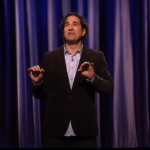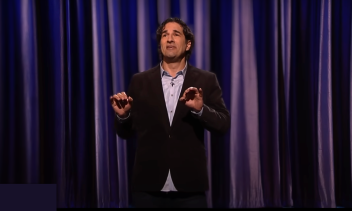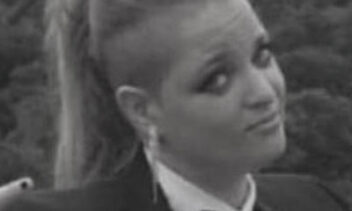This month, 18Forty is thinking about comedy and its relevance to contemporary cultural and religious life, available here. Comedy is about more than laughs; 18Forty founder David Bashevkin’s introduction to this topic considers comedy’s worth to one’s personal life and journey. But what about Jewish humor? What drives Jews to joke, in spite of it all? This week’s Weekend Reader offers you an expanded perspective on the relationship between Jewish hope and Jewish humor, all part of this month’s content at 18Forty. Read on to better understand the hope, history, and humor of the Jewish people.
History says, don’t hope
On this side of the grave.
But then, once in a lifetime
The longed-for tidal wave
Of justice can rise up,
And hope and history rhyme.
So hope for a great sea-change
On the far side of revenge.
Believe that further shore
Is reachable from here.
Believe in miracle
And cures and healing wells.
– Seamus Heaney
In a time and context in which Jewishness is almost synonymous with humor, it may be hard to believe that for a long time Jews weren’t considered to be particularly funny. As Jeremy Dauber points out on the very first page of his book on Jewish comedy:
A lot of outside observers considered them downright glum. The early twentieth century British philosopher Alfred North Whitehead, for example, remarked that Jews were “singularly humorless”; his slightly early contemporary, the historian and critic Thomas Carlyle, asserted that the Jews showed not the slightest trace of humor at any period of their history, and the novelist George Eliot suggested that “the Literature of the Hebrew gives an idea of a people who went about their business and their pleasure as gravely as a society of beavers.”
Facing centuries of physical and economic persecution, Jews shouldn’t be blamed for being a bit glum, but there are always polemical biases that may have influenced the views of these not-quite-objective outside observers. But it may not just be these distant Britons that thought of Jewish history as lacking humor. If someone were to stop you and ask for the most tragic moments in Jewish history, the challenge would be in winnowing out the options. Akedat Yitzchak, the Golden Calf, the Breaking of the Luchot, the Cheit HaMeraglim, destruction of the Temples … the list goes on and on. But what if someone were to ask you for the funniest moments in Jewish history? After 1920, we have the “15 Greatest Moments in Jewish Comedy History,” but what about the funniest moments in the entirety of Jewish history? The erudite may think of a particularly rib-shaking Talmudic quip, the more Purim-oriented readers may suggest the turnabouts of Megilat Esther, but where are the truly great comedic moments of Jewish history?
To talk about Jewish humor, we have to talk about Jewish hope, to appreciate the deep ways we have created hope by creating humor.
If the reader of this Reader is at all like the writer of this Reader, you may have had a hard time. Why might this be so challenging? Why is it so hard to think of any comedic moments in the whole of Jewish history? While this might be endemic to all historical consciousness, which privileges the morbid to the mundane, there may be a deeper issue at hand.
To answer this, we turn to a 20th century Jewish historian. In 1963, eminent Jewish historian Salo Baron wrote a paper titled “Newer Emphases in Jewish History,” in which he articulated a position that would fundamentally redraw the lines around the study of Jewish history. Reflecting on what would become known as the ‘anti-lachrymose view of Jewish history,’ Baron said:
All my life I have been struggling against the hitherto dominant “lachrymose conception of Jewish history” … because I have felt that an overemphasis on Jewish sufferings distorted the total picture of the Jewish historic evolution.
Perhaps referring to earlier Jewish historians like Heinrech Graetz , Baron pushed back on a conception of Jewish history that viewed this history as a set of persecutions and expulsions. As a historian, Baron argued for a more balanced perspective, uncolored by the bias towards the negative. However, even with a more balanced perspective, the history of the Jewish diaspora is a remarkable account of countless pogroms, persecutions, and peregrinations. When thinking through our own history, it is too easy to focus only on the traumatic travels through the diaspora, and on the Torah we created in those travels. In Baron’s words: “suffering is part of the destiny, but so is joy as well as ultimate redemption.”
Yosef Haim Yerushalmi, Baron’s student who held the Salo Wittmayer Baron Chair at Columbia University, went further. In 1985, Yerushalmi wrote “Toward a History of Jewish Hope,” in which he argued passionately for the need to study the history of Jewish hope. He quotes a fellow historian, who asks “Why is it that, although hope is one of the fundamental factors that have shaped history, it has almost never been the subject of direct historical investigation for its own sake?” Like Baron, Yerushalmi knew that Jewish history consists of joy and hope, along with suffering. Yerushalmi felt that the heights of hope and the depths of despair must be studied together:
Hope that comes too easily is a hope that cannot impress. This, therefore, is crucial: we cannot explore the history of Jewish hope without at the same time exploring the history of Jewish despair. Only when we become painfully aware of the historical depths of Jewish despair, only when we take it seriously, will we begin to realize that Jewish hope is not an historical “given” to be taken for granted, but an historical problem that we have not yet begun to recognize, let alone comprehend.
In the poem that opens this Weekend Reader, Irish poet Seamus Heaney writes: “hope and history rhyme.” These are Heaney’s most famous words, and they evoke a sense that perhaps in the end, history will all work out. But quote-happy readers often miss the context of the rest of his poem, in which Heaney acknowledges that “history says, don’t hope.” This is an acknowledgement that history does not lead one naturally towards hope. But “hope and history rhyme,” even if it is only “once in a lifetime,” as Heaney puts it. Some of us may have experienced such moments. The Jewish people, in the twentieth century, experienced both the ways history and hope can rhyme, as well as the many ways they so often don’t.
We know that hope is not easily born. In the gap between history and hope, between what is and what could be, or should be, is where humor enters our conversation. How did this become a history of hope, from a conversation on Jewish humor? Because humor and hope are intimately bound together. To talk about Jewish humor, we have to talk about Jewish hope, to appreciate the deep ways we have created hope by creating humor. In the space between history and hope, when the two have not rhymed, humor has helped us find hope in our history.
Comedy lives in the space between hope and history, laughing at the incongruity. In his introduction to this month’s content, 18Forty founder David Bashevkin points to the words of James K. Feibleman:
Comedy, then, criticizes the finite for not being infinite. It witnesses the limitations of actuality, just as a tragedy witnesses the fragmentary exemplifications of the logical order. Tragedy affirms continuity by showing how it exists in every actual thing and event. Tragedy shows the worth of every actual, down to the most ephemeral, and so is always close to the permanent value of the worshipful. Comedy comes to the same affirmation, but inversely and by indirection, just as one might affirm beauty by criticizing the ugly. Comedy catches the principle of unity in every finite thing…
David comments:
Great comedians are commentators. They highlight a finite world in disarray and through comedy, a lens of meaning is superimposed onto our quotidian lives. Comedy seeks a life with meaning and when situations and circumstances seem bereft of sense, comedy provides one.
Looking at history — national and personal — looking at the finite facts of one’s life, and laughing at the disarray, allows and engenders hope. Where does this leave us? Over the course of Jewish history, we have learned that God plans and man laughs. At God, for God, with God – we laugh. This same Seamus Heaney is said to have once said that “hope is a condition of your soul, not a response to the circumstances in which you find yourself.” But perhaps humor, like hope, is actually both. Perhaps humor, like hope, is a condition of the soul that allows one to respond to the circumstances in which one finds oneself. And so it goes – with humor, and hope, we travel through history.








